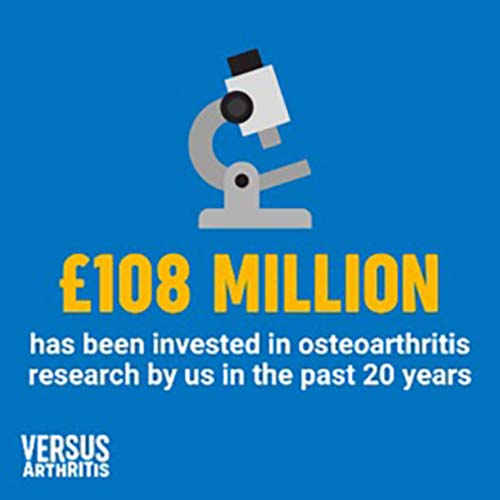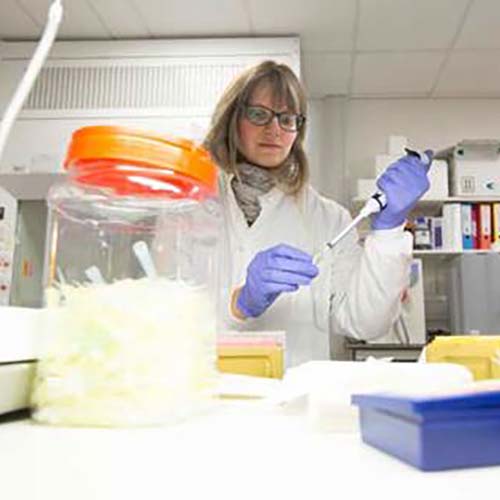World Osteoarthritis Day: How our research is shaping the future of joint health
17 September 2024
Over the past 20 years, our understanding of osteoarthritis has completely changed, and Versus Arthritis' funded researchers have been at the forefront of improvements in the diagnosis, treatment and management of osteoarthritis.
Find out more about our research and how your donations can power tomorrow’s breakthroughs.
Our commitment to osteoarthritis research
Osteoarthritis affects 10 million people across the UK, with its symptoms having a severe impact on lives and livelihoods. Yet the pain, loss of mobility and fatigue of osteoarthritis is too often brushed off as "just a bit of wear and tear".
We know that is not true. Osteoarthritis is an active disease and should be taken seriously.
Why osteoarthritis isn’t “just a bit of wear and tear”
Our joints are made up of complex living tissue that our bodies repair and maintain. Osteoarthritis happens when this repair and maintenance is disrupted. This can lead to damage which can make our joints painful and stiff.
That's why we have invested more than £108 million into osteoarthritis research over the last 20 years, making us one of its top 10 global funders.
Over that time, our research funding has helped us to build a clearer picture of the complexity of osteoarthritis.
Your donations have helped us make real progress over the past 20 years
We now know a lot more about osteoarthritis’ root causes and how it progresses.

Our research investment has given us new ways to develop treatments, and novel methods for managing and preventing osteoarthritis.
- We discovered that our genes play a significant role, but so does how we live our lives.
- We understand much more about how osteoarthritis progresses over time.
- We have found potential treatments, and we are working hard to develop these.
- We have also improved the range and success of the treatments we do have.
- We know more about the importance of early diagnosis and how to manage symptoms.
Want to know more? Well, we’ve selected a few of the biggest discoveries from our researchers that have changed how we understand osteoarthritis.
Better understanding the origins of osteoarthritis
Our researchers have made many important discoveries about what causes osteoarthritis.
Osteoarthritis is not a passive or simple process
In reality, when our body attempts to repair itself, there’s an elaborate inflammatory response sometimes called mechanoflammation. Researchers are now investigating targets, such as retinoic acid, to try and stop it.
Osteoarthritis is also not an inevitable part of ageing
In fact, a £2 million project called arcOGEN found that DNA plays a big role in whether we develop osteoarthritis or not. Genes that we inherit from our parents right from birth, and small chemical changes that happen to our DNA by the way we live our lives, called ‘epigenetics’, are both at play.
How has our research improved the management of osteoarthritis?
We may not be able to change our genetics, but we can change our lifestyle.

Maintaining a healthy weight, through a balanced diet and regular exercise, are widely-accepted factors that can improve the symptoms of osteoarthritis and stop it from developing in the first place.
Our research helped unlock the link between obesity and knee osteoarthritis risk. This finding stemmed from the Chingford Cohort, which collected long-term information from 1,000 women in North-East London. We funded this cohort study with over £750,000 between 1989 and 2012.
This cohort holds such rich information that it has supplied robust evidence for other researchers to use in different ways, to learn from and be inspired by.
It is now being used as part of a global collection of the biggest arthritis cohort studies called WorldCOACH.
Working alongside people living with arthritis, our research centres have co-produced evidence-based leaflets and guidebooks to equip you with the information you need to take better control of your health.
FIND OUT MORE about these evidence-based leaflets and guidebooks.
Targeting treatments
Different people experience osteoarthritis differently, so a one-size-fits-all approach won't treat everyone effectively.
Over the past decade, our research centres of excellence have made great strides in understanding osteoarthritis at a cellular level.
What was previously thought to be just one disease is now being grouped into different sub-types of osteoarthritis. Each form advances differently, and this may mean that different treatments may work better for some people than others.
It also means we are better able to predict whether or not somebody may experience increasing pain over time, who may need surgery sooner, and who may not.

Our researchers have discovered several potential breakthroughs that could help people with osteoarthritis in future. These include:
- Potential drug targets such as agrin, ROR2 or TSG-6
- Repurposing an existing drug called methotrexate, that has already been used for decades to help people with inflammatory arthritis.
These new potential treatments are exciting, but larger studies are needed to ensure they are effective and safe. We know this will take time.
Until then, our research continues to support people through improving current treatments. Our research was critical to the NHS approval of a cell therapy treatment called autologous chondrocyte implantation (ACI), which can help prevent osteoarthritis in some patients with small areas of cartilage damage. We have since invested in research to further understand how we can improve these treatments and make them more successful, using stem cell therapies or even by 3D printing cells.
Our researchers have helped us to better understand how to prepare people for joint replacement surgery, and support them afterwards, improving the success of the surgery.
We’re not done yet
We've made great strides towards improving the diagnosis, management, and treatment of osteoarthritis. However, there is still a long way to go to make sure everyone with osteoarthritis has access to the treatments and support they need, with real hope for a cure.
To get us closer, we will soon be launching an ambitious funding call to bring together teams of scientists with different expertise to help us make even larger steps towards preventing, treating, and hopefully curing osteoarthritis.
Despite Versus Arthritis being one of the largest global funders of osteoarthritis research, overall UK funding lags far behind the enormous impact osteoarthritis has on people, the economy and society. With your support, we will keep pushing this research forward to improve the lives of the 10 million people it affects.
Support our continuing research